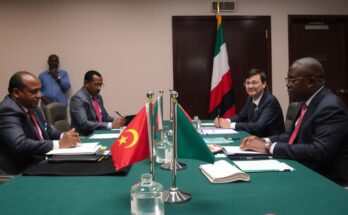COP29 in Baku offers the UK an opportunity to lead on climate action as the U.S. demonstrates uncertainty under Trump. Attendance is markedly lower, posing potential challenges for impactful discussions. However, the UK government asserts a strong commitment to engagement, signaling a chance for fruitful dialogue and collaboration. Addressing climate change requires emphasis on voices from the Global South and accountability among affluent nations for support and action against rising temperatures.
As COP29 unfolds in Baku, the opportunity arises for the United Kingdom to establish itself as a leader in climate action, especially in light of the United States’ wavering commitment under President Donald Trump. The initial outlook for this year’s conference was disparaging even prior to the U.S. election, compounded by the reality that Trump’s administration is expected to emulate past withdrawal from global agreements, notably the Paris climate accord. The upcoming discussions will be challenged by the absence of many key figures, as various nations are not sending representation at heads-of-state or government levels, severely limiting the potential for impactful dialogue. Further complicating matters is Azerbaijan’s controversial background, particularly regarding its human rights records and the geopolitical tensions in the region. This year also marks a troubling trend of rising global temperatures, surpassing the targeted increase of 1.5 degrees Celsius, showcasing the urgent need for constructive international collaboration. The recent failures in global negotiations pertaining to nature conservation only exacerbate the challenges facing COP29 as climate change continues to surrender precedence to more immediate national concerns. Yet, amidst these challenges are opportunities; the changing landscape following the U.S. election could catalyze increased cooperation among various nations, particularly within Europe. With fewer high-profile leaders attending COP29, there is potential for earnest, nuanced dialogues among officials who possess deep subject-matter understanding. The UK government has voiced a commitment to participate actively, marking a significant shift from previous representations that seemed lackluster. Prime Minister Sir Keir Starmer and Energy Secretary Ed Miliband are expected to leverage this occasion to assert the UK’s capability at the international climate stage, potentially influencing cooperative efforts concerning climate finance and mitigation strategies. As discussions proceed, it is essential to amplify the voices from the Global South and to acknowledge the strides taken by nations such as China in developing sustainable practices, underscoring the necessity for collaborative learning and action in addressing the climate crisis. While COPs may yield mixed results, the advancement of climate commitments, however slow, is critical. COP29 carries the hope for substantial dialogue and agreements that affirm the responsibility of affluent nations to contribute meaningfully to global climate initiatives, setting a constructive path ahead for COP30 in Brazil.
The 29th Conference of the Parties (COP29) serves as a crucial global summit aimed at accelerating action against climate change. The United Kingdom, freshly out of the European Union, stands at a significant juncture to assert its leadership in climate matters, particularly given the impending changes in U.S. leadership that herald uncertainty regarding America’s commitment to international climate agreements. As this conference takes place amidst various geopolitical tensions and the pressing threat of climate change becoming increasingly evident with record high temperatures and extreme weather events, the need for meaningful collaboration and financial investment to support vulnerable nations is paramount.
In conclusion, COP29 presents a complex yet potentially fertile ground for climate leadership by the UK and underscores the necessity of unified global efforts to address climate change. Despite the challenges posed by diminished representation and geopolitical tensions, opportunities for innovation and collaborative action exist. The focus must now shift towards empowering voices from the Global South and driving meaningful commitments from developed nations to facilitate substantial progress ahead of future COP meetings.
Original Source: www.independent.co.uk




